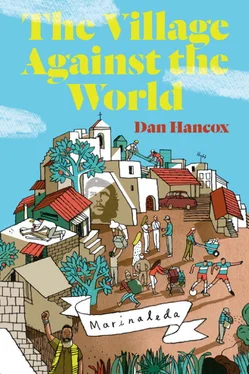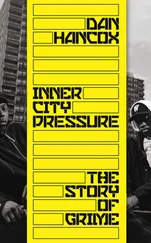Palo Palo specializes in rock music, booking bands with such illustrious names as DP Ebola and Anvil of Doom. As one critic sarcastically complained, ‘They have broad taste at Palo: punk, hard metal, dark metal, Satanic metal.’ It’s not entirely fair.
León took a liking to me the first time he met me, when an English filmmaker, Uzma, was visiting too. He came around the bar to join us for shot after shot of sweet rum liquor (on the house, at his insistence). As the clock ticked gently past 3 am, he swayed to the live blues guitarist’s mixture of French, Spanish and English rock and pop – playing to a crowd of less than ten.
León dragged the ashtray over and leaned in closer, drunker, to tell us that Andalusia is a nation without borders, with many different people and cultures – it’s the place of the Moors, too. He said it proudly, and it wasn’t the first time I had heard marinaleños speak that way of their ancestry as Al-Andalus, as well as Andalusia. He was probably showing off to Uzma a bit, since she had ancestors from the Indian subcontinent and was a relatively rare non-white face in the village, but he meant it, too. ‘No borders!’ he exclaimed. ‘For me, it’s just people.’ He brought up Israel and Palestine, India and Pakistan, Spain and Morocco. They’re all brothers and sisters, he said.
As talk turned to politics, he oscillated between finger-jabbing seriousness and rocking back on his bar stool, laughing a big toothy grin. ‘I’m not a socialist, or a communist,’ he announced eventually, wagging his index finger. ‘Then what is your philosophy – what are we drinking to?’ I asked.
He reeled back, swung around to grab the next round of sweet caramel rum and raised it with outstretched arm, as if to make a big announcement to the room, to the world at large.
‘ La libertad. ’

6
Opposition in Utopia
Mariano Pradas asked to meet us on the very edge of Matarredonda, where the smaller end of the village drops suddenly away into open fields, and Avenida de la Libertad splits into two, south towards Estepa, or east towards Herrera. We parked on a dirt layby next to the junction, and since it was a gloriously sunny day, we got out and stood by the car until he turned up. It felt like waiting to do a drug deal, or a hostage exchange. Passengers in passing cars turned their heads to glance curiously at the four young men idling on the edge of the village in the middle of the afternoon – I had brought along Javi, from Estepa, Ezequiel, from Marinaleda, and Dave, my photographer friend from London.
Eventually Mariano pulled up, parked alongside us and got out, shaking hands with everyone, cautiously friendly, but formal. Then we got back in our cars, and followed him through the winding olive groves out of town. After fifteen minutes or so he indicated a turning, a rocky dirt track cut right into the middle of the groves – so narrow that I could have reached out the window and picked the olives off the trees. The path wound slowly and bumpily up a gentle incline, to a cottage located behind high wire mesh fences topped with barbed wire. ‘Wow. I guess this is the opposition compound?’ muttered Dave, only partially in jest, as three dogs jumped up to the gate. One was massive, two were almost comically tiny, which took the edge off the slight atmosphere of unease.
In the cottage, we sat down at the kitchen table, and Mariano rolled up one blind above the sink. We remained in this dim half-light for the couple of hours we sat there and talked. It was only a simulacrum, but we really felt like we were in hiding.
I had got the sense that Mariano Pradas is rather unfairly maligned in Marinaleda, where he is one of two elected Socialist Party (PSOE) councillors, alongside the nine of Sánchez Gordillo’s Izquierda Unida (IU). He tends to slink around town. On the night of Marinaleda’s February carnival, while I was having dinner with friends in one of the less popular (and thus conveniently emptier) village cafés, Mariano came in on his own, looked around slightly shiftily, had a quick, quiet conversation with the grumpy, boss-eyed owner, and crept off again. He and the other PSOE councillor, José Rodríguez Cobacho, rarely join in with any of the community’s cultural events: they say they don’t feel welcome. Crucially, neither of them actually live in Marinaleda itself; they’re both up the hill in Estepa.
To commence his victory speech after the local elections in 2012, Sánchez Gordillo announced to the waiting crowd, as if delivering the football scores, ‘Marinaleda 9, Estepa 2’ – and was met with enormous cheers. Little could better elucidate the incredible persistence of that key facet of Andalusian life: you are your pueblo , and as long as the PSOE representatives live in Estepa, their dedication to and understanding of the life of Marinaleda will be called into question.
Pradas would counter, fairly, that he was born in Marinaleda, he grew up there, and his family are from there. He remembers the bad old days, the daily struggle of life under the dictatorship, and his analysis of the dire state the village was in before the 1980s isn’t that different from Sánchez Gordillo’s – a desperately poor pueblo surrounded by latifundios , and a people heedlessly left to starve by a political elite with no interest in them.
I was curious to know how anyone from the PSOE, a nominally socialist party, would even begin to make a case against the jornaleros ’ long, successful fight for the land. Sure enough, Pradas was careful not to dismiss the struggle, or the land occupations. ‘In part, it was a good thing,’ he said, in an I-hold-my-hands-up sort of way. ‘The jornaleros have some land now, and that’s a good thing. But it doesn’t provide everyone with as much work as they claim. There is not full employment here, not even close – the real problem is the lack of industry in Andalusia.’ The CUT/SAT fixation on winning the land was a myopic obsession, the way he told the story of the 1980s: ‘A lot of different things are necessary to make progress,’ he explained, ‘not just fields.’
What about the hunger strike, I asked. ‘The truth?’ He laughed a little, involuntarily: not derisive, or disrespectful, but an irreverent laugh, directed at the legend built up around it. ‘The truth is, it has been massively sentimentalised. The majority of people had nothing to do with it.’ He repeated Félix Talego’s analysis, that it was first and foremost a well-orchestrated media event, coordinated from the top by Sánchez Gordillo with the help of the union and the party.
‘Marinaleda is a divided pueblo . Sánchez Gordillo has worked hard to make sure it is divided, using the assemblies, the TV station, and so on. If you are not on his side, that puts you on the right, that makes you a fascist – and you are attacked, you are insulted, you are intimidated.’ Their first task, he said, if the PSOE won control of the village council, would be to restore freedom of thought, and let people make their own decisions, without the polarity of being either ‘pro’ or ‘anti’ the mayor. They would consider questions of how to run El Humoso, and all the other aspects of Sánchez Gordillo’s Marinaleda, after that.
Sure, Pradas said, you have a secret ballot, and a free vote – but it’s the other aspects of life in the village which are undemocratic: people know if you are with Sánchez Gordillo or not. ‘If you’re not clearly a fanatic, people assume you are the other way.’ And the assemblies? ‘They are only a superficial expression of democracy. Those who are not Gordillistas would never bother going in the first place, and those who are, are mostly attending because they know it will help them get work in El Humoso.’ It is, he said, no different from the era of the caciques – the informal biases, the distribution of work and favours to people on ‘the right side’.
Читать дальше













